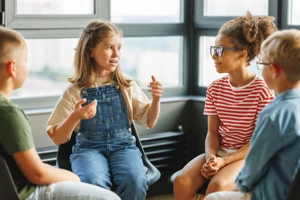Focus groups with deaf and hard of hearing children
02/06/2025
For the June edition of our newsletter, we spoke to A/Prof Valerie Sung from the Centre’s Hearing Research team about her work engaging children who are deaf and hard of hearing. This work will inform the development a set of key outcomes to be recorded in the Australian National Child Hearing Health Outcomes Registry (ANCHOR).
Why did you want to involve the perspectives of children in your work?
Most research in children’s healthcare relies solely on the perspectives of adults (such as parents or healthcare providers) to drive improvements. Children who are deaf and hard of hearing are rarely asked directly, ‘What matters to you?’
Our project prioritises the perspectives of children to identify what outcomes they believe are most important for hearing health services to collect. Their answers will directly inform our broader work in creating Australia’s Core Outcomes Set to track the development of deaf and hard of hearing children through ANCHOR.
Only by directly involving children’s voices can we ensure our Core Outcome Set will align with what children truly need to feel understood, supported and empowered.
Children who are deaf and hard of hearing are rarely asked directly, ‘What matters to you?’
How will you involve children and young people?
We are involving deaf and hard of hearing children aged 6–12 through creative, accessible focus groups. These group sessions have been designed using the Voice of the Child toolkit to incorporate drawing, play, visual prompts, and discussion to help children express their views in ways that feel natural and comfortable. Using the Voice of the Child toolkit enables us to capture the unique expressions of children.
To adapt the toolkit resources for deaf and hard of hearing children, we are including Auslan interpreters alongside trained facilitators to support communication, ensuring every child feels understood and empowered to contribute. These sessions will later be transcribed and analysed to highlight common themes and priorities for deaf and hard of hearing children.
What will be the impact of this work?
Although data collection is still ahead of us, this project will address the current gap in child-led research in paediatric hearing healthcare. Additionally, the findings will directly shape our broader work in developing Australia’s first Core Outcome Set for child hearing health, ensuring the outcomes are child-centred.
Ultimately, we aim to use this work to guide the creation of tailored interventions, support informed decision making for families, and inform policy. We hope this project will help standardise the inclusion of children’s voices in decisions that affect them, shifting practice towards more inclusive, responsive and effective models of care.

